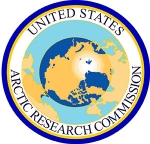
The U.S. Arctic Research Commission (USARC), an independent federal agency created by the Arctic Research and Policy Act of 1984, is charged with recommending arctic research policy to the President and Congress and reporting to Congress on the progress of the Executive Branch in reaching goals set by the Commission. The Commission holds business meetings and conducts public hearings in Alaska and elsewhere to receive input. Major recommendations of the Commission are published in the Commission's biennial Report on Goals and Objectives for Arctic Research, as well as the Commission's Special Report series.
USARC Launches Arctic Science Portal Prototype
As part of a broader interagency effort on the Arctic, the USARC has initiated development of a prototype science portal. The Arctic Science Portal has been recently launched on the USARC home page. It serves as a library of links (URLs) to websites where arctic data are made publicly available. The portal is neither an interactive website nor is it a site where data are archived. Instead, it is a tool that directs users to available information on the Arctic sorted in the main categories of society, environment, economics, references, and organizations. USARC staff encourage users of the portal to provide feedback.
USARC Report on Arctic Oil Spill Research
Commission Chair Fran Ulmer released the USARC report entitled "Oil Spills in Arctic Waters: An Introduction and Inventory of Research Activities and USARC Recommendations" on 13 November 2012 at the U.S. - Canada Northern Oil and Gas Research Forum. The report, co-authored with the U.S. Army Cold Regions Research and Engineering Laboratory (CRREL), is a compilation of recent research and contains recommendations for future work in areas including oil spill response technologies for cleanup and recovery of oil, data management tools, and the effects of oil on the environment.
"As oil and gas development and shipping increase in the Arctic, it's important to prepare and plan for possible accidents. Preparation includes research into oil in icy waters: how it behaves, how to locate and map oil under ice, how different response techniques could be adapted to be more effective even in arctic conditions. The USARC report catalogues the research which has been done and by whom, and it makes recommendations for future research. We hope this will be useful to government, industry, and the public," said Ulmer, who was also a member of President Obama's National Commission on the BP Deepwater Horizon Oil Spill and Offshore Drilling.
USARC and Canadian Polar Commission Participate in Northern Oil and Gas Research Forum
As part of their ongoing collaboration, the Canadian Polar Commission (CPC) and the USARC helped organize, and participated in, the Third Biennial U.S. - Canada Northern Oil and Gas Research Forum held 13-15 November 2012 in Anchorage, Alaska. The forum provided an opportunity for experts from both countries to discuss knowledge gaps, research priorities, and the links between research and informed decision-making and sustainable oil and gas development in arctic basins including the Chukchi and Beaufort Seas.
Chairs Fran Ulmer (USARC) and Bernard Funston (CPC) presented remarks to the forum addressing the uniqueness and vulnerability of the northern environment, which requires a new way of doing business with high levels of expertise and safety as a core priority; effective collaborations between the two countries; the need for more reliable and trusted systems to gather and effectively use Indigenous traditional knowledge; and the importance of the research communities' capacity to adapt to the periods of diminished research funding. An initial joint summary of the key points and conclusions of the forum is available online as a USARC press release and supplement, which is available here.
The Canadian Polar Commission, created by an Act of Parliament in 1991, is Canada's national institution for furthering polar knowledge and awareness. The CPC supports sharing information about the polar regions through enhanced connections among northerners, research communities, governments, and the general public, and provides analysis of current and emerging polar issues. For more information about the Canadian Polar Commission, please see here.
The Arctic Research and Policy Act of 1984 established the USARC. Its principal duties are to develop and recommend an integrated national arctic research policy and to assist in establishing a national arctic research program plan to implement the policy. Commissioners also facilitate cooperation between the federal government, state and local governments, and other nations with respect to basic and applied arctic research. For more information about USARC, its meetings, workshops, and resources, see here.
